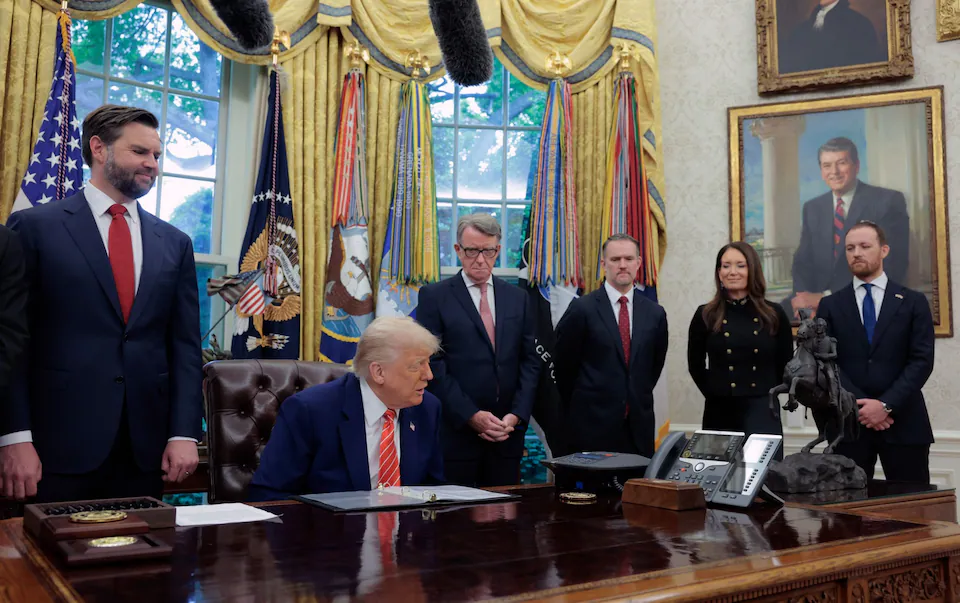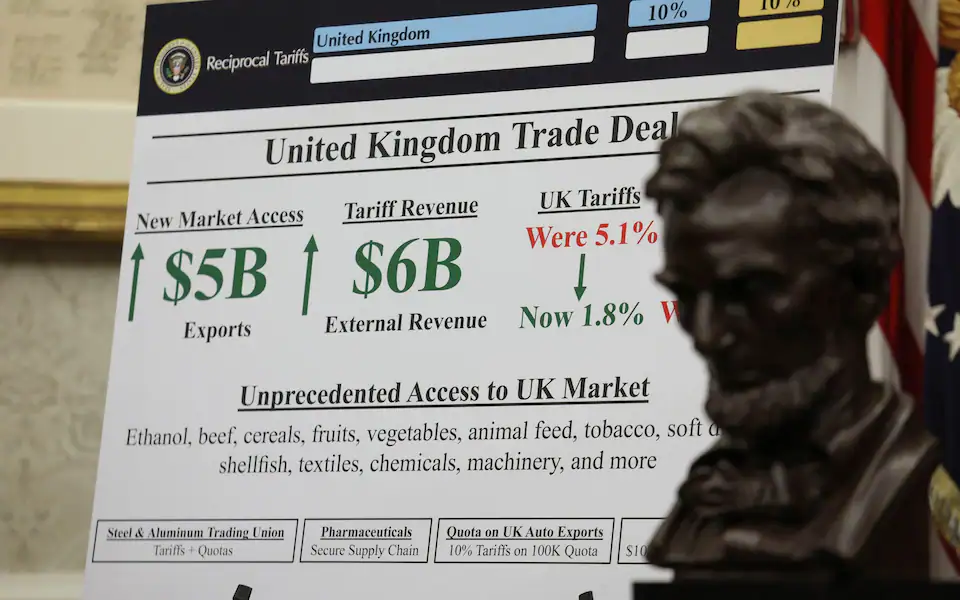By Tony Diver. Media: Telegraph
Sir Keir Starmer has given Donald Trump a “veto” over Chinese investment in Britain.
The two world leaders announced a long-awaited trade agreement on Thursday that will lower steel and car tariffs for British companies and boost trade.
Mr Trump said that the UK and US would have a “better relationship than ever before” and that the agreement had been struck “because of Brexit”.
Sir Keir said the agreement would “protect, save and enhance jobs”, especially in the luxury car industry.
Tariffs on cars will fall from 25 per cent to 10 per cent immediately, while the rate on steel and aluminium will be reduced from 25 per cent to zero.
But The Telegraph has learnt that under the terms of the deal, the US will also have the ability to object to Chinese companies investing in the UK, in a clause the Conservatives said amounted to a “veto”.
The agreement said that both countries “intend to co-operate on the effective use of investment security measures”, which could involve blocking Chinese takeovers.
Government sources said the US would not have an outright veto, but that Washington could “flag” concerns about Chinese companies buying up key infrastructure.
That could trigger the National Security and Investment Act, which allows ministers to intervene in takeovers on national security grounds.
A source close to the talks said the deal amounted to a “sort of veto” for the US on “major China investment” that had been “extremely important to the Americans” during talks.
But Dame Priti Patel, the shadow foreign secretary, said allowing the US to intervene on foreign investment decisions showed Sir Keir had made too many concessions to Mr Trump.
“Keir Starmer has already given Trump a bigger UK tariff cut than Trump has given him,” she said.
“Now it looks like he’s effectively handed America a veto over investment decisions in the UK. When Labour negotiates, Britain loses. The US has told Starmer to jump, and he’s said, ‘how high?’”
Thursday’s agreement is not a comprehensive trade agreement, but will reduce tariffs on British cars and steel, while giving American companies some tariff-free access to UK beef and ethanol markets, with quotas.
It was announced in a joint phone call, which was televised from Washington and the West Midlands, where Sir Keir later addressed workers at a Jaguar Land Rover factory.

On Thursday night, the Trade Secretary suggested that car industry workers were perhaps “days” away from losing their jobs without the new trade deal.
Jonathan Reynolds told the BBC’s Newsnight programme that “we were at risk of thousands of people losing their jobs” without an agreement.
The deal comes despite Mr Trump long criticising the dominance of Chinese goods on global markets and his pledges to protect US businesses from cheap imports.
The White House has also asked the UK for assurances that steel and pharmaceutical products exported to the US do not originate in China, amid fears the deal could be used to “circumvent” Mr Trump’s punishing tariffs on Beijing.
Jonathan Reynolds, the Business Secretary, said the deal had effectively saved car manufacturers that were at risk of thousands of job losses within weeks if Mr Trump’s 25 per cent tariffs remained in place.
But Kemi Badenoch, the Conservative Party leader, said Britain had been “shafted” by the deal. The former business secretary noted UK tariffs on the US had been 5.1 per cent on average and were now 1.8 per cent, while US tariffs on the UK were 3.4 per cent on average before Mr Trump took office and were now the universal 10 per cent applied to all countries.

The deal was announced after a phone call between Sir Keir and Mr Trump on Wednesday night, when the Prime Minister was watching Arsenal play in the Champions League semi-final.
Negotiators finalised the terms before the US president announced online that there would be a “major” deal with a “big and highly respected” country.
He said on Thursday that the EU had treated America “extremely unfairly” but the UK became the first nation with a trade deal “because of Brexit in particular”.
The agreement also commits the US and UK to future co-operation on technology. As part of the talks, a major British airline committed to buy $10 billion of aeroplanes and parts from the American firm Boeing.
A further agreement on what Mr Trump calls “reciprocal” tariffs of 10 per cent on all goods is expected in the coming months.
Lord Mandelson, the US ambassador, said the deal was “not the end, it’s the end of just the beginning”.
The UK will also receive preferential treatment when the US next imposes tariffs on a specific sector.
Mr Trump has said he is minded to increase the rates on foreign pharmaceutical companies and film studios, both major British exports.
The US president’s concern about Chinese investment in Britain comes after warnings that Beijing already has too much control over UK infrastructure, including through partnerships on batteries and offshore wind backed by Ed Miliband, the Energy Secretary.
Mr Miliband has since agreed to strip solar panels made with Chinese slave labour out of supply chains used in the UK.
Speaking to reporters about the investment security rules, Mr Reynolds said the US and UK had “shared national security priorities”.
“It’s particularly appropriate to be able to agree that with the US on the 80th anniversary of VE Day,” he said. “There’s symbolism there.”
On Thursday, Mr Trump signalled that he may cut tariffs on China. He said levies on China “can only come down”.
But a government spokesman said: “This is categorically untrue. The deal says we will continue to co-operate on our shared economic security, including on investment screening measures already in place.
“We will also work together to protect our industries from any third country investment that concerns either one of us. This will be done on basis of equal partnership, and is not, in any way, a veto.”




























































































Discussion about this post